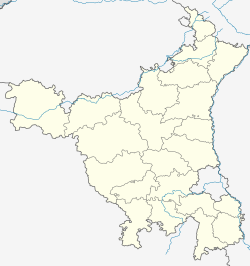Fatehabad, Haryana
|
Fatehabad फतेहाबाद ਫਤਿਹਾਬਾਦ پھتےهاباد |
|
|---|---|
| city | |
| Location in Haryana, India | |
| Coordinates: 29°31′N 75°27′E / 29.52°N 75.45°ECoordinates: 29°31′N 75°27′E / 29.52°N 75.45°E | |
| Country |
|
| State | Haryana |
| District | Fatehabad |
| Elevation | 208 m (682 ft) |
| Population (2001) | |
| • Total | 59,863 |
| Languages | |
| • Official | Haryanvi, Hindi |
| Time zone | IST (UTC+5:30) |
| PIN | 125050 |
| Telephone code | 1667 |
| ISO 3166 code | IN-HR |
| Vehicle registration | HR |
| Website | haryana |
Fatehabad is a city and a municipal committee in Fatehabad district in the state of Haryana, India.
Aryans at first on the banks of the rivers -the Saraswati and the Drishadvati, and in the course of their expansion covered a wider area of Hisar and Fatehabad. The area was probably included in the kingdom of Pandavas and their successors. Pāṇini mentions quite a few towns of the region-Aisukari, Taushayana (Tohana) and Rori which have been identified with Hisar, Tohana and Rori, respectively2. According to Puranas, the areas of Fatehabad district remained a part of Nanda empire. The discovery of Ashokan pillars at Hisar and Fatehabad shows that the area of the district remained a part of Mauryan empire. The people of Agroha area assisted Chandragupta Maurya in the war against Greeks. After the fall of the Mauryas and Shungas, the Agras along with the Yaudheys-the republican tribes of the region-asserted for their independence. The Agras settled in the region covering Agroha and Barwala. They issued coins from Agroha, the capital headquarters.
As attested by the discovery of coin-moulds and terracottas, the region was a part of Kushan Empire. According to A.S. Altekar, the Yaudheys made a second bid for independence towards the end of the 2nd century AD, came out successful in their venture and succeeded in freeing their home-land and ousting Kushans. This finds support from the Agroha seal1. The early 11th century saw the Ghaznavid inroads in this area. Sultan Masud led the expeditions towards Agroha.The Chauhans seem to have taken special measures for protecting the area against Muslim incursions. The area of Agroha passed on to the Muslim rule after the defeat of Prithviraj III in the Second Battle of Tarain (1192).
...
Wikipedia


